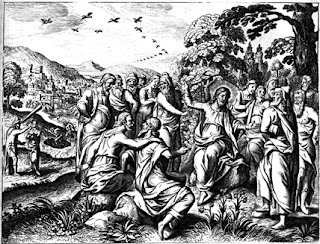 |
| Jesuit, 17th Century |
My Reverend Father,
I send to Your Reverence The invoice of this year, 1702,
for The Ilinois missions, and for The 3 fathers who are now there. I beg You
not to be surprised if it be somewhat large, It is to supply clothes and
provisions for three fathers, besides Brother guibort and perhaps Brother
gillet, who are in need of everything; and to begin at last to supply, once for
all, The principal items of all that is required for 3 missions — which have
always been borrowing; which have always lacked most of the necessary articles;
And wherein The missionaries have done nothing but languish. Father bineteau
died there from exhaustion; but, If he had had a few drops of Spanish wine, for
which he asked us during his last illness, and some little dainties, — such as
sugar, or other things, — or had we been able to procure some Fresh food for
him, he would perhaps be still alive. Father pinet and father marest are
wearing out their strength; and they are 2 saints, who take pleasure in being
deprived of everything — in order, they say, that they may soon be nearer
paradise. But they do not fail to tell me and to write me that I must bring
some little comforts for the sick, and that these languish because they are in
need of everything; and they tell the truth [Page 25] For my part, I am in good health, but I have no cassock,
etc.; I am in a sorry plight, and the others are hardly less so.
Three winter cassocks.
3 pairs of winter hose.
3 lined cloaks.
3 summer cassocks; 3 pairs of winter and 3 of summer breeches.
3 pairs of summer hose.
3 pairs of cloth breeches for winter.
6 pairs of breeches of black duck or strong linen.
12 hempen shirts, lined;[1]
calico handkerchiefs;
Cap linings.
4 hats; 3 hoods; 3 pairs of mittens.
One Livre of black Wool.
Half a livre of black and other silk.
One Livre of fine white thread.
2 livres of black thread. 1 livre of twine for Nets.
3 Lines; 3 whip-[lashes?].
3 livres of coarse white thread.
6 pairs of Shoes.
3 pairs of double-soled slippers.
3 pieces of white thread galloon.
One thousand pins.
One Ream of good and strong paper, of large size.
One Ream of small-sized paper. 3 good razors, with a whetstone.
3 sticks of Spanish wax. 3 half-double caps.
12 [small] towels and 6 [small] napkins.[2]
3 covered bowls for The sick.
12 pewter spoons, with knives and forks.
[illegible — 6 case-knives?] in
6 sheaths.
3 deep pewter basins with a narrow edge. [Page 27]
6 plates.
3 tinned kettles with lids, and strong, to hold 6 pots each.[3]
One Syringe; one livre of Theriac; ointment, plasters, alum, vitriol,
aniseed, medicines, and pastils.
One host-Iron, and shape for cutting the wafers.
50 livres of flour, in a Barrel. 3 Tin boxes.
One minot of Salt, In a Barrel.
A jar of oil.
A Barrel of 15 pots of vinegar.
30 livres of Sugar.
Rice, raisins, prunes.
25 pots of Spanish wine, In 2 kegs.
25 pots of brandy.
9 livres of pepper.
One Livre of nutmegs and cloves.
Six pairs of half-worsted hose.[4]
[Material for making] awnings as a protection against the gnats that infest the
mississipi.
One piece of strong sail-cloth.
One livre or 2 of cotton candle-wicking.
India ink and cotton [illegible].
A thousand nails, large, medium-sized, and small.
150 livres of powder.
50 livres of assorted shot, large and small.
30 livres of Bullets; [500 gun-flints].
Ten livres of vermilion.
Ten livres of large glass Beads — black, white, and Striped.
Ten livres of small glass Beads — white, green, and transparent.
One gross of large Clasp-knives, with horn handles.
One gross of round buckles, both large and medium-sized.
One gross of small metal plates[5]
[Page 29]
Six gross of small belts.
Six gross of finger-Rings.
3 gross of awls.
One thousand needles.
Six boxes of gun-flints.
Twenty gun-screws.
One dozen [wooden?] combs.[6]
3 dozen Spools of fine iron wire, or Else a roll of fine wire.
Six Bars of soap.
Three dozen hatchets — medium-sized, large, and small.
Three dozen medium-sized hoes.
Three hatchets [illegible] 3
mattocks.
One dozen trade shirts — large, medium-sized, and small.
Six blue capotes — large, medium-sized, and small.
Six ells of stuff for capotes, to make Breech-clouts.
Thirty livres of good tobacco.
Three dozen wax candles, and
Six livres of Wax tapers for the 3 missionaries.
The same is needed in proportion for each mission; and a
chapel, with all its accessories, is required for The missionary to the Scious,
since a father will be sent there; and he has need of a man, if Monsieur Le
Sueur does not defray all His expenses.[7]
Your Reverence will see Him about it. You will find this a very long list, but
Nothing can be Omitted from it if you wish the missionaries to have any
comfort. Since it costs nothing for The fort to the Missionaries of quebec, —
who have Received through Monsieur d’Iberville 10 times more than they asked, —
we Shall not be in a worse condition; and he has written to me that we should
bring out engagés (hired men] from France, whom we could [Page 31] get There cheaper than here, and whose passage would cost
us nothing.”[8]
[Endorsed:
“March 5, 1702. Invoice.”]






